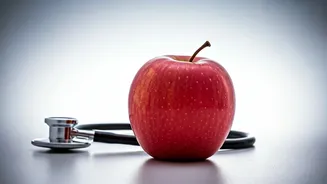Embrace Regular Exercise
Consistent physical activity is a cornerstone in the fight against high blood pressure. Experts suggest that engaging in at least 150 minutes of moderate-intensity
exercise, or 75 minutes of vigorous-intensity exercise each week, can significantly improve blood pressure readings. This doesn't mean you need to hit the gym every day; it's about incorporating movement into your daily life. Consider brisk walking, jogging, cycling, or swimming. These activities not only help lower blood pressure but also contribute to overall cardiovascular health, reducing other risk factors like high cholesterol and obesity. Remember to start slowly and gradually increase the intensity and duration of your workouts, consulting with a healthcare professional before beginning any new exercise routine, especially if you have pre-existing health conditions.
Watch Your Diet
Dietary choices play a crucial role in managing blood pressure. One of the most effective dietary approaches is the DASH (Dietary Approaches to Stop Hypertension) diet. This eating plan emphasizes fruits, vegetables, whole grains, lean protein, and low-fat dairy products. It's also important to limit your intake of sodium, saturated and trans fats, and added sugars. Focusing on potassium-rich foods like bananas, spinach, and sweet potatoes can also help balance sodium levels, which positively impacts blood pressure. Preparing meals at home more often allows you to control ingredients and portion sizes, making it easier to stick to a heart-healthy diet. Remember to read food labels carefully to monitor sodium content and make informed choices.
Cut Back Sodium
Reducing sodium intake is essential for blood pressure management. The recommended daily limit is generally around 2,300 milligrams, but for many people, especially those with high blood pressure, a lower intake of 1,500 milligrams is preferable. Sodium, often found in high amounts in processed foods, fast food, and canned goods, causes your body to retain fluid, which increases blood pressure. Start by limiting your consumption of processed snacks, ready-made meals, and salty condiments. Cook at home more often, using fresh ingredients, and season your food with herbs and spices instead of salt. Read food labels carefully and choose low-sodium or no-salt-added options. Gradually reducing your sodium intake can lead to a significant improvement in your blood pressure over time.
Limit Alcohol Intake
Excessive alcohol consumption can significantly raise blood pressure. For men, moderate alcohol consumption is defined as up to two drinks per day, while women should limit themselves to one drink per day. Drinking more than these amounts can increase blood pressure over time, as well as lead to other health problems. If you currently drink alcohol excessively, consider gradually reducing your intake, or better yet, abstain entirely. Monitor how your body responds to the change. If you choose to drink, do so in moderation and consider alternating alcoholic beverages with water to stay hydrated. Consulting with a healthcare professional for personalized advice on alcohol consumption is always a wise decision.
Manage Stress Effectively
Chronic stress can contribute to elevated blood pressure. When stressed, your body releases hormones that temporarily increase blood pressure. Over time, frequent stress can lead to chronically high blood pressure. Finding healthy ways to manage stress is therefore crucial. Techniques like deep breathing exercises, meditation, yoga, or spending time in nature can help calm your mind and body. Regular physical activity also serves as a great stress reliever. Make time for activities you enjoy, whether it's reading a book, listening to music, or spending time with loved ones. If stress is overwhelming, consider seeking help from a therapist or counselor who can provide tools and strategies for managing stress effectively. Prioritizing mental well-being is vital for overall health and blood pressure management.
Monitor Regularly, Seek Help
Regular monitoring of your blood pressure is key to understanding and managing your condition. Use a home blood pressure monitor to track your readings regularly, and keep a log to share with your doctor. This allows you and your healthcare provider to identify any patterns and make necessary adjustments to your treatment plan. In addition to lifestyle changes, your doctor may prescribe medication to help lower your blood pressure. It is crucial to take these medications as prescribed and to never stop or adjust your dosage without consulting your doctor. Regular check-ups with your doctor are important to assess your overall cardiovascular health and address any concerns you may have. Early detection and proactive management are crucial for preventing serious health complications associated with high blood pressure.














